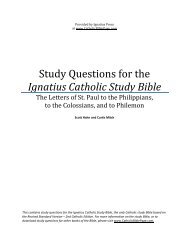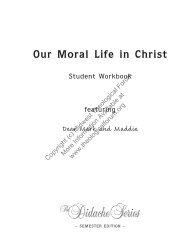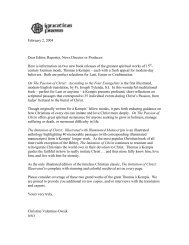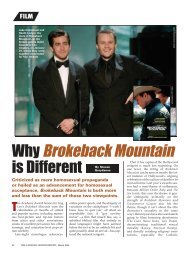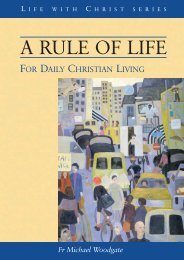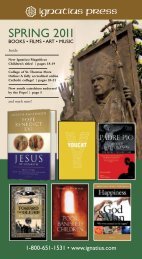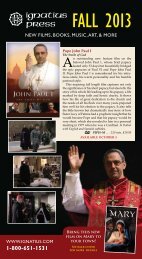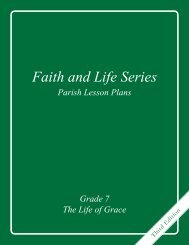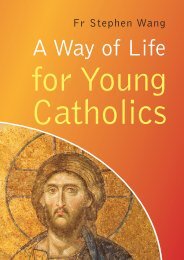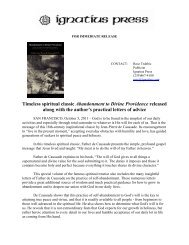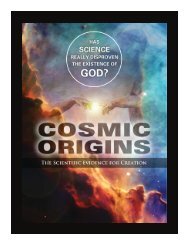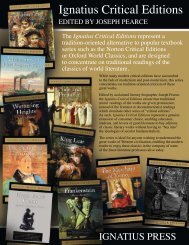SPRING 2013 - Ignatius Press
SPRING 2013 - Ignatius Press
SPRING 2013 - Ignatius Press
- No tags were found...
Create successful ePaper yourself
Turn your PDF publications into a flip-book with our unique Google optimized e-Paper software.
new <strong>SPRING</strong> books<br />
Evangelical Catholicism<br />
Deep Reform in the 21st-Century Church<br />
George Weigel<br />
The Catholic Church is on the threshold of a<br />
bold new era in its two-thousand year history.<br />
As the curtain comes down on the Church<br />
defined by the 16th-century Counter-Reformation,<br />
the curtain is rising on the Evangelical Catholicism<br />
of the third millennium: a way of being Catholic<br />
that comes from over a century of Catholic reform;<br />
a mission-centered renewal honed by the Second<br />
Vatican Council and given compelling expression<br />
by Blessed John Paul II and Pope Benedict XVI.<br />
The Gospel-centered Evangelical Catholicism of<br />
the future will send all the people of the Church into<br />
mission territory every day—a territory increasingly<br />
defined in the West by spiritual boredom<br />
and aggressive secularism. Confronting both these<br />
cultural challenges and the shadows cast by recent<br />
Catholic history, Evangelical Catholicism unapologetically<br />
proclaims the Gospel of Jesus Christ as<br />
the truth of the world. Thus the Catholicism of the<br />
21st-century and beyond will be a culture-forming<br />
counterculture, offering all men and women of<br />
good will a deeply humane alternative to the soulstifling<br />
self-absorption of postmodernity.<br />
Drawing on thirty years of experience throughout<br />
the Catholic world, from its humblest parishes<br />
to its highest levels of authority, George Weigel<br />
proposes a deepening of faith-based and missiondriven<br />
Catholic reform that touches every facet of<br />
Catholic life—from the episcopate and the papacy<br />
to the priesthood and the consecrated life; from<br />
the renewal of the lay vocation in the world to<br />
the redefinition of the Church’s engagement with<br />
public life; from the liturgy to the Church’s intellectual<br />
life. Lay Catholics and clergy alike should<br />
welcome the challenge of this unique moment in<br />
the Church’s history, Weigel urges. Mediocrity is<br />
not an option, and all Catholics, no matter what<br />
their station in life, are called to live the evangelical<br />
vocation into which they were baptized.<br />
EVCA-H . . . 304 pp, Hardcover, $27.95<br />
E indicates availability as an e-Book on ignatius.com<br />
A indicates availability as an audio download on ignatius.com<br />
11<br />
The Second Vatican Council<br />
The Four Constitutions<br />
Introductory Essay by Pope Benedict XVI<br />
This collection includes the four constitutions of<br />
the Second Vatican Council, the most popular<br />
and key documents for understanding the Council<br />
itself, its decrees, and its declarations.<br />
Few events in the history of the modern Catholic<br />
Church have been as far-reaching as the Second<br />
Vatican Council (1962-1965). And few have been<br />
as controversial. No one denies great changes have<br />
come about since the close of the Council. Have<br />
the changes been all good, all bad, or a mixture of<br />
both To what extent were the changes, for good or<br />
ill, the result of the Council itself<br />
The popes of the Council—John XXII and Paul<br />
VI—and their successors—John Paul I, John Paul<br />
II and Benedict XVI, who also participated in the<br />
Council—have insisted that the Council itself was<br />
the work of the Holy Spirit. They have aggressively<br />
criticized misinterpretations and distortions<br />
of it. They insist that the Council be understood<br />
in fundamental continuity with the Church’s<br />
Tradition, even while deepening the Church’s selfunderstand<br />
and calling for authentic reforms and<br />
renewal of Catholic life.<br />
Readers can learn for themselves what the<br />
Second Vatican Council taught using this highlyaccessible<br />
collection of its basic texts.<br />
This book uses the Catholic Truth Society translation<br />
and features:<br />
• The Constitution on the Sacred Liturgy,<br />
Sacrosanctum Concilium<br />
• The Dogmatic Constitution on the Church,<br />
Lumen Gentium<br />
• The Dogmatic Constitution on Divine<br />
Revelation, Dei Verbum<br />
• The Pastoral Constitution on the Church in<br />
the Modern World, Gaudium et Spes<br />
Plus, the collection includes an introductory<br />
essay by Pope Benedict XVI explaining how best<br />
to understand the Second Vatican Council in the<br />
history of the Church.<br />
CTS:SVC-P . . . 300 pp, Softcover, $15.95<br />
1-800-651-1531<br />
www.ignatius.com




